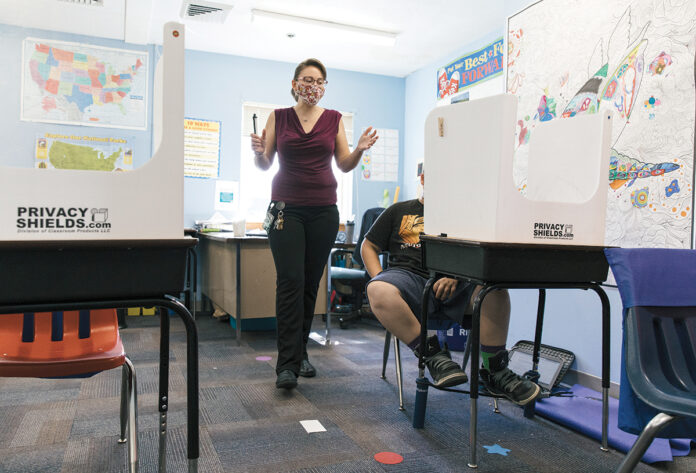
Providing essential services to those with disabilities can be challenging in the best of times.
But as the COVID-19 pandemic disrupted life for many people, essential services still have to be delivered to those immediately needing them. Additionally, such organizations are looking long term to remain sustainable into 2021 and beyond.
Providence-based The Groden Network, which educates and supports children and adults with autism and other developmental disabilities, has continued its work. The group homes the nonprofit operates never closed during the crisis.
“We are delivering our community and home-based services virtually,” Groden Director of Administration Michael Pearis said. “That is an ongoing service challenge, and we have done a great job doing that.”
Groden also has recently reopened schools in Coventry and Providence partially, as well as day programs for adults in both Massachusetts and Rhode Island. However, Pearis said they’ve been delivering distanced learning even when the physical schools were closed and equipment has been provided to children, including laptops and educational material to perform while at home.
At St. Mary’s Home for Children in North Providence, Development Officer Evangelina “Vangy” Auclair said COVID-19 has had a significant impact on the way they provide their services. The home provides residential and outpatient services for those seeking mental health services and a specialized K-12 school for students who have psychiatric diagnoses or emotional disturbances.
The pandemic’s early lockdowns had far-reaching emotional challenges on children at St. Mary’s. Staff had to keep children busy and help them understand health guidelines. On the outpatient side, Auclair said patients are having therapy sessions through telemedicine via Zoom or Google Meet.
“We understand trauma, we know how to treat trauma,” Auclair said. “You can only imagine, it’s challenging when you have such a raw state, you have trauma and you can’t get face-to-face therapy with your trusted therapist.”
What helped Groden through the crisis is that funding has never stopped, Director of Marketing and Development Catherine Nassa said. Funding from places such as the R.I. Department of Education and R.I. Department of Children, Youth and Families has continued to come into the organization. Additionally, Gov. Gina M. Raimondo’s mandating of insurance funds and telehealth have been a “godsend” financially, Nassa said.
Auclair also said funding from RIDE and DCYF was unaffected by the pandemic but declined to offer specifics as to how much funding St. Mary’s receives from the state.
In terms of finances, Auclair said donors have been extremely generous, including from the Rhode Island Foundation and United Way of Rhode Island through the COVID-19 Response Fund. Also, St. Mary’s recently received a grant from the Red Sox Foundation supporting the organization’s COVID-19 Nutrition Program.
St. Mary’s also hosted a virtual event in September, raising more than $90,000 for the home. It plans to hold another such event in 2021.
Auclair said that there have been cost increases during COVID-19, including hazard pay for residential counselors and increased cleaning of facilities. Looking ahead, she said that St. Mary’s accounted for any incremental costs in its 2021 fiscal year budget and will seek new sources of funding through grants, corporate and individual donors, and other financial avenues.
Pearis said Groden is speaking with state partners and trade organizations such as the Rhode Island Coalition for Children and Families about funding in 2021. Nassa said Groden hopes to increase its corporate-giving efforts to support current expenses for personal protective equipment.
Groden officials also said the organization has to be “nimble” with delivering services given the uncertainty with the state’s finances, especially since 70% of Groden’s revenue comes from the state.
“Everything that happens at the state level trickles down to us; we’re no different than any other nonprofit or human services provider,” Pearis said. “We rely heavily on state funding, both at the state and local level. So, to the extent that there’s some worry about the state of the state, that trickles down to us.”











